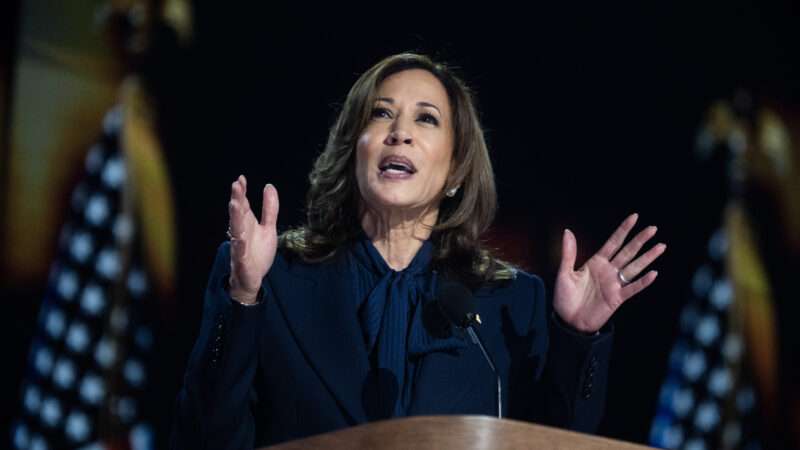
In her acceptance speech at last week's Democratic National Convention, Vice President Kamala Harris promised to deliver "a middle-class tax cut that will benefit more than 100 million Americans."
Her campaign has yet to flesh out the details of that idea, but what little is known about Harris' tax proposals suggests that middle-class families will face a tax hike in a Harris administration—albeit an indirect one.
Nearly all Americans would face a higher federal tax burden if Harris followed through on President Joe Biden's proposal to raise the corporate income tax to 28 percent from 21 percent. The New York Times reported this weekend that Harris' campaign has signaled that she supports Biden's plan for $5 trillion in tax hikes—including an $1.3 trillion increase of the corporate income tax.
Confusingly, the Times also specifies that "no one making less than $400,000 a year would see their taxes go up"—a talking point that Biden has used for years and that Harris is apparently preparing to adapt (and the Times is happy to parrot).
But that is simply not true. The Joint Committee on Taxation, a bipartisan congressional number-crunching entity, ran the numbers on that corporate income tax hike when Biden proposed it earlier this year. According to the committee's analysis, even Americans in the lowest income category (those earning less than $10,000) would see a tax hike if the corporate income tax was increased.
That's because higher corporate taxes are passed along to consumers, employees, and investors in the form of high prices, lower wages, and lower investment returns. If you buy things, have a job, or save for retirement, higher corporate income taxes will fall on you—no matter how many times Biden, Harris, and the Times pretend otherwise.
Harris should be asked about the effects of higher corporate taxes on the middle class, when and if she ever holds a press conference.
Of course, Harris isn't the only candidate in this year's election promising an indirect tax hike on virtually all Americans. Former President Donald Trump's proposal for new tariffs of 10 percent (or even 20 percent, as he's said more recently) on all imports would cost Americans an estimated $300 billion annually.
And Trump's campaign is also refusing to acknowledge reality. In an interview with NBC's Kristen Welker this weekend, Sen. J.D. Vance (R–Ohio) was asked about the fact that consumers ultimately the cost of tariffs. "What it really does is penalize importers," Trump's running mate responded.
Saying that tariffs penalize only importers is almost exactly like saying that a corporate income tax affects only corporations. Both are deliberately myopic attempts to ignore the consequences of these policies. And in both cases, the candidates are assuring voters that someone else will pay the cost of these tax hikes—wealthy corporations or China—despite a well-established track record showing that both forms of taxes are passed along to consumers and workers in various ways.
You can try to tax corporations and you can try to tax imports, but all taxes are paid by people in the end—including lots of people who make less than $400,000 annually.
The post Kamala Harris' Plan To Hike Corporate Income Taxes Would Fall on All Americans appeared first on Reason.com.







